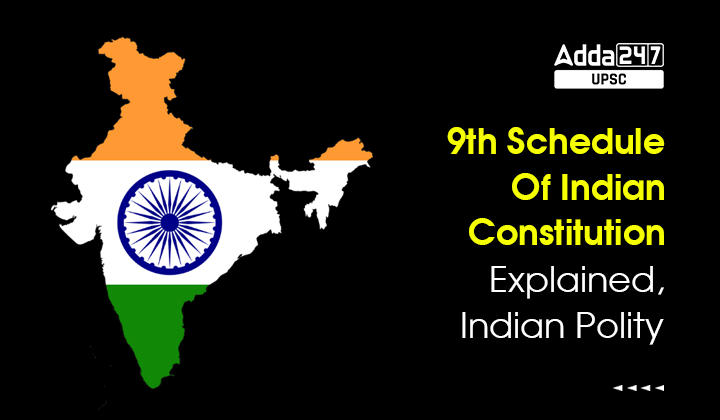Table of Contents
9th schedule of Indian constitution: The 9th schedule of Indian constitution is a provision in the Constitution of India that was added by the First Amendment in 1951. The Ninth Schedule provides protection to laws that have been included in it from judicial review. The following article deals with all the important details about the 9th schedule. The viewers interested in 9th schedule can visit this article to know all the details
Background of 9th schedule of Indian constitution
The 9th schedule was added to the Indian Constitution to provide protection to laws that were enacted to bring about socio-economic changes in the country. These laws were often challenged in the courts on the grounds that they violated fundamental rights. The government felt that such laws were necessary for achieving the larger public interest and should be protected from judicial review.
Laws Included in the 9th schedule of Indian constitution
Over the years, several laws have been included in the 9th schedule. Some of the most important laws are have been listed below in this article:
- The Kerala Land Reforms Act, 1963
- The Tamil Nadu Backward Classes, Scheduled Castes and Scheduled Tribes (Reservation of Seats in Educational Institutions and of Appointments or Posts in the Services under the State) Act, 1993
- The Maharashtra Agricultural Lands (Ceiling on Holdings) Act, 1961
- The Uttar Pradesh Zamindari Abolition and Land Reforms Act, 1950
- The Madhya Pradesh Ceiling on Agricultural Holdings Act, 1960
Protection under the 9th schedule
Laws included in the Ninth Schedule are protected from judicial review on the grounds that they violate fundamental rights. This means that even if a law violates a fundamental right, it cannot be struck down by the courts if it has been included in the Ninth Schedule.
However, this protection is not absolute. In 2007, the Supreme Court ruled that laws included in the Ninth Schedule are not immune to judicial review if they violate the basic structure of the Constitution. This means that if a law included in the Ninth Schedule is found to violate the basic structure of the Constitution, it can still be struck down by the courts.
Criticism of the 9th schedule of Indian constitution
The 9th schedule of Indian constitution has been criticized on several grounds. One of the main criticisms is that it violates the basic structure of the Constitution by taking away the power of the courts to review laws that violate fundamental rights. This is seen as a violation of the principle of separation of powers, which is a key feature of the Indian Constitution.
Another criticism is that the 9th schedule has been used to protect laws that benefit certain groups at the expense of others. For example, the Tamil Nadu Backward Classes, Scheduled Castes and Scheduled Tribes (Reservation of Seats in Educational Institutions and of Appointments or Posts in the Services under the State) Act, 1993, which provides reservation to certain groups in educational institutions and government jobs, has been criticized for discriminating against other groups.
9th schedule of Indian constitution
The 9th schedule is an important provision in the Indian Constitution that provides protection to laws that are necessary for bringing about socio-economic changes in the country. While the protection provided by the 9th schedule of Indian constitution is not absolute, it has been criticized for violating the basic structure of the Constitution and for being used to protect laws that discriminate against certain groups.
Judiciary Related Links:
Himachal Pradesh Judiciary Previous Year Question Papers
Himachal Pradesh Judiciary Syllabus
Himachal Pradesh Judiciary Exam Eligibility



 TSPSC Group 1 Question Paper 2024, Downl...
TSPSC Group 1 Question Paper 2024, Downl...
 TSPSC Group 1 Answer key 2024 Out, Downl...
TSPSC Group 1 Answer key 2024 Out, Downl...
 UPSC Prelims 2024 Question Paper, Downlo...
UPSC Prelims 2024 Question Paper, Downlo...




